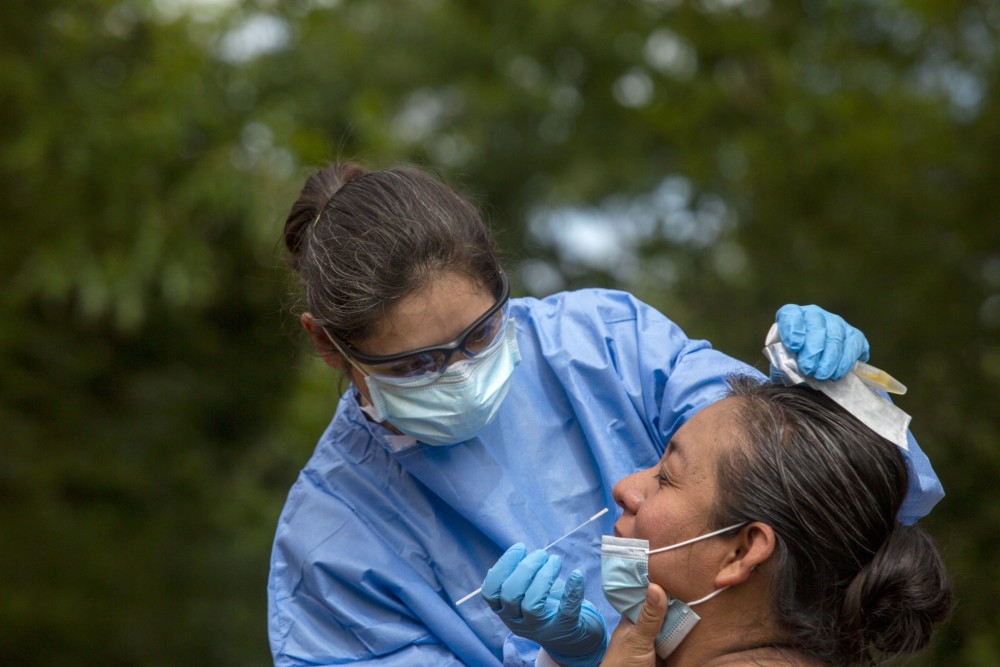By Alex Brown
Stateline.org
WWR Article Summary (tl;dr) Dr. Ingrid Katz, an infectious disease specialist at the Harvard Global Health Institute says the lack of guidance, “undermines the ability of businesses to predict how and when and where to do (testing).”
WASHINGTON
Testing employees for the coronavirus as they come into work will be an important step in safely getting Americans back on the job. But employers have been left to their own devices as they navigate the public health and legal minefield of creating testing plans for the workplace.
“It’s the Wild West out there when it comes to testing,” said Scott Oswald, managing principal of the Employment Law Group, which specializes in workplace issues. “There really is no standard at all, and employers are left to come up with decisions about testing on their own.”
Public health experts agree the lack of guidance has left business owners in a difficult situation.
“Because we do not have a federal response, it undermines the ability of businesses to predict how and when and where to do (testing),” said Dr. Ingrid Katz, an infectious disease specialist at the Harvard Global Health Institute.
“As businesses try to reopen, there will be increasing shortages of the testing that is available,” she said. “If not the federal government, at least states need to create a unified plan for procuring testing and really prioritizing high-risk places like nursing homes.”
Oswald and Katz say they’ve seen little direction from states when it comes to workplace testing. As a result, employers have had to decide whether to test their workers, how often to conduct the tests, where to procure the supplies and how to act on the results. Each step of the process comes with substantial liability, along with the obvious health implications.
In April, the federal Equal Employment Opportunity Commission told businesses they could test employees for COVID-19, an exemption from the Americans with Disabilities Act. Many companies, such as Amazon and Ford Motor Co., already are providing some testing for some workers. But given the lack of a coordinated system, that may only exacerbate the problem.
“Employers are now competing with hospitals, they’re competing with states, competing with the federal government for tests,” Oswald said. “Employers are willing to pay more, so you’ve got suppliers that say, ‘Amazon’s willing to pay me X amount, either you meet that price or I’m not going to be able to supply it to you.'”
Amazon CEO Jeff Bezos has called for regular workplace testing “across all industries,” but Amazon did not respond to Stateline questions about its testing strategy.
Many small businesses are playing a “waiting game” as uncertainty lingers around workplace testing, said officials at Paycor, a nationwide human resources payroll and software company. Larger, better-connected employers may have more resources to set up a testing plan, the company said.
The governors’ offices in Florida, Illinois, Maryland, Massachusetts, Michigan, New York, Virginia and Wisconsin did not respond to questions about their states’ guidance for workplace testing. Public health officials in Pennsylvania and California said they have not issued any directions for employers that wish to test their workers.
Pennsylvania has mandated that businesses conduct temperature checks of all essential workers, which Oswald said is more detailed than the guidance most states have offered. Nate Wardle, press secretary at the Pennsylvania Department of Health, noted that the state has overseen testing at private food processing and distribution facilities with outbreaks.
“We do not have a clear guidance from our federal authorities on how to do this, and it’s being left to the states, with employers left holding the bag,” Oswald said. “It’s employees whose health and safety is being compromised.”
Despite the uncertainty, employers still face pressure to test. In Nevada, the Culinary Workers Union called on casino resorts to implement regular testing for all employees. Detroit has threatened to shut down grocery stores that don’t get their employees tested.
Many large employers have offered few details about their testing plans. Walmart responded to a Stateline inquiry by providing a transcript of a May earnings call in which CEO Doug McMillon said a team was working to “sort out” the company’s testing strategy. Ford replied to a request for comment with a mid-May press release announcing testing for symptomatic employees in some locations. U.S. Steel, which said early last month that it was considering a testing plan, told Stateline it had nothing new to disclose.
Last week, Walmart received a warning from 12 state attorneys general asserting that the company had failed to sanitize stores and alert employees after workers tested positive for COVID-19.
Smaller companies also are struggling. Pegasus Building Services, a janitorial company in San Diego, told the San Diego Union Tribune that it’s offering tests to its 400 employees in partnership with a local laboratory. However, the company is still uncertain about how often it will be able to test and how much it will cost.
“I don’t think testing one time is the answer,” company President Jeff Becker told the newspaper. “I could drive away tomorrow, head to the office, stop to get gas and get contaminated on the gas pump.”
Employers that want to test face a myriad of considerations. According to Katz, about 40% to 45% of COVID-19 carriers are asymptomatic or presymptomatic, so requiring tests only for employees who fail a temperature check or symptom screening is an ineffective strategy.
“You cannot just screen on symptoms alone,” she said. “You have to have some kind of universal plan in terms of who to test and when to test them.”
Meanwhile, the invasive nasal swab procedure that produces the most accurate test results could be an issue for some employees. Oswald, the attorney, said companies may need to consider accommodations for employees who may suffer an anxiety attack from the procedure.
Katz added that an effective workplace testing regime may not be possible until researchers produce an accurate saliva test that can produce results in minutes.
Once companies decide to conduct testing, Oswald said, they are opening themselves to liability on several fronts.
“An employer’s going to be on firm (legal) ground if they choose not to test but they meet the other CDC guidelines,” he said. “That’s why this is so difficult, because once they step into the realm of testing, the employer’s creating liability for itself.
buy cialis daily online blackmenheal.org/wp-content/themes/twentytwentytwo/inc/patterns/en/cialis-daily.html no prescription
“
The Centers for Disease Control and Prevention instructs employers to require masks for their workers, procure any personal protective equipment necessary to maintain safety, separate sick employees, offer flexible sick leave, promote frequent handwashing and regularly clean workplaces. The agency has not outlined workplace testing practices.
If a business chooses to provide testing that produces an inaccurate result, it will be on the hook for the consequences, experts said.
“If an employer tests, it’s going to own the results, and it’s going to own any errors,” Oswald said.
Companies also could be liable if they create a testing program but are unable to procure supplies to keep it operating weeks or months later. Once an employer has established that testing is necessary to keep its workers safe, it must meet its own standard, Oswald said.
And if an employee tests positive, it’s unclear whether the company may call in a local health department to conduct contact tracing and instruct other exposed employees to quarantine, or whether it must take those steps on its own in the interest of speed.
Senate Majority Leader Mitch McConnell of Kentucky and some other Republicans, bolstered by groups like the U.S. Chamber of Commerce, have called for more liability protections for businesses as they try to navigate staying afloat while keeping employees safe during a pandemic. It’s still unclear what immunity would be given to businesses related to testing, and Democrats say they’re more focused on worker protections.
Employers also must take care to protect workers’ medical privacy. While businesses must act if employees test positive, they can’t disclose the names of employees who are infected. Katz noted that in small workplaces it may be impossible to shield the identity of a worker who tests positive, as their absence in the wake of testing will create obvious implications.
As conditions vary widely across states and industries, there’s no set standard for the frequency of testing, either.
“Some people would say daily tests, some people would say weekly tests, but it has to be very regular, and it can’t be based on symptoms,” Katz said.
She added that many companies may not be able to afford the massive amounts of testing that reopening will require. That means government might have to provide a testing structure.
“If you’re a nursing home or some other facility that doesn’t have the resources or ability to make your own tests, you’re going to need the state to step in and supply it,” she said. “States need to take over, establish clear priorities of which businesses need to open first and stock those places with the testing needed. This is why it’s so critical that the government take control of this. Otherwise each business is left to fend for themselves at every level.”
___
Distributed by Tribune Content Agency, LLC.















































































































































































































































































































































































